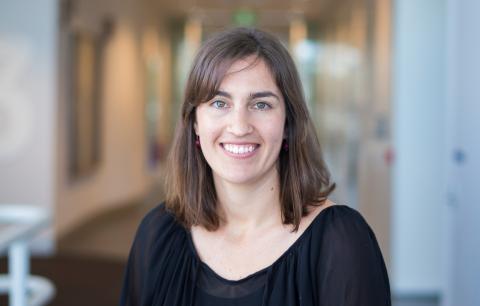
A Melbourne Genomics Clinical Project not only enabled Dr Lilian Downie to find a specialty, but also gave her a grounding in health economics and helped her reach a global platform with her work.
Diving into genomics and hearing loss
When she started with Melbourne Genomics in 2016, Dr Lilian Downie was a Clinical Genetics trainee. At the time, she – and others – regarded hearing loss as a straightforward disease area to work in where children are relatively well.
This changed when she joined the team as the funded clinician on Melbourne Genomics' Congenital Deafness Clinical Project, doing her PhD on establishing new genetic hearing loss clinics and genomic testing of children with deafness.
"It was a good experience working in deafness clinics," said Dr Downie. "Getting to know and understand the parents, and seeing how keen they were for answers and genomic testing."
"Being able to offer genomic testing to provide more certainty had a bigger impact than we expected. When the Clinical Project finished up, the team were frustrated we wouldn't be able to offer it anymore. So I asked myself 'what can I do about it?'"
After establishing the clinical value of these new clinics and testing models, Dr Downie decided to do the second part of her PhD in health economics. Seeing the success of other Melbourne Genomics clinical projects in establishing health economics and securing Medicare funding led her to embark on the journey.
"Being able to do health economic analysis was so crucial in securing permanent funding for genomic testing in congenital deafness, along with working with the labs on the types of test and establishing the value of the test to patients.”
Medicare funded genomic testing for congenital deafness will come into effect later this year. Because of her work in this area, Dr Downie was invited to join the Childhood Hearing Australasian Medical Professionals network, where she co-authored consensus guidelines on how children with hearing loss should be managed. She is also the designated genetics expert, often offering advice at the network's bi-monthly meetings.
Exploring additional findings
Dr Downie also explored offering 'additional' findings to the cohort of patients in the Congenital Deafness Clinical Project, known as the Baby Beyond Hearing Project.
Testing for ‘additional’ findings means deliberately analysing the genome for gene changes that have health implications unrelated to a patient’s current medical condition.
As part of this, Dr Downie undertook a Melbourne Genomics Ambassadorship trip to the Broad Institute in Boston, USA to present her work. This led to an invitation to join the steering committee for the International Consortium of Newborn Screening.
Dr Downie's Baby Beyond Hearing work has also led to her participation in a MRFF funded project on genomic newborn screening.
Beyond Melbourne Genomics
Dr Downie's time with Melbourne Genomics has enabled her to create significant personal impact in her area of work.
"Being able to publish all of the work from my PhD has been excellent. That's how I really got the invitations – my work is out there for others to see and has led me to meet so many important, senior figures in this space," said Dr Downie.
"It feels like I've been able to do a lot of things for my career stage because of the relationships established from these opportunities.”
